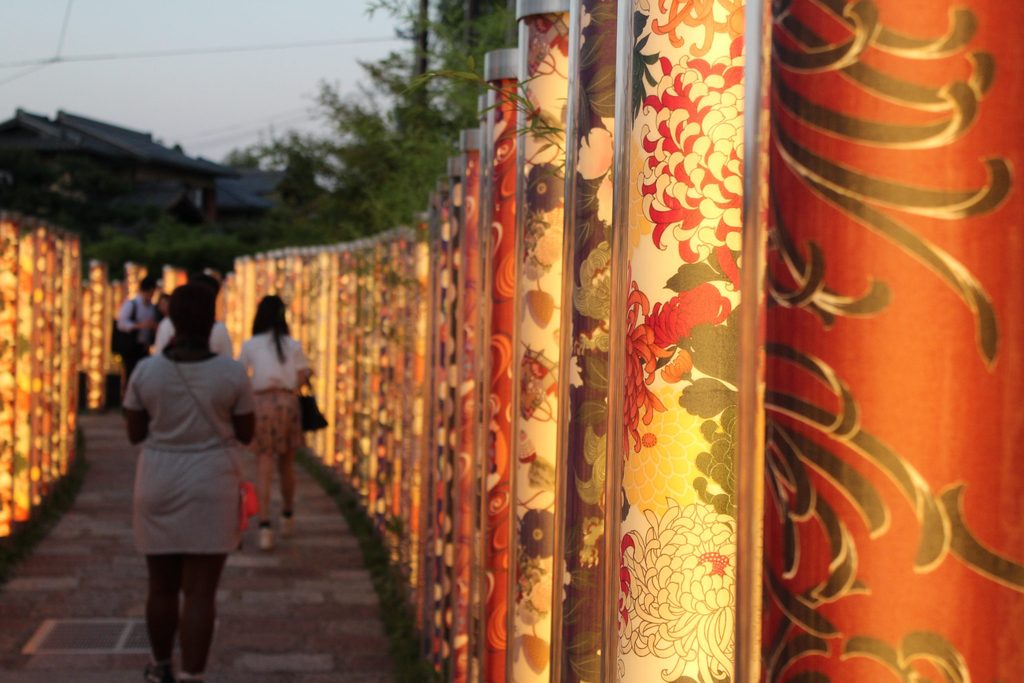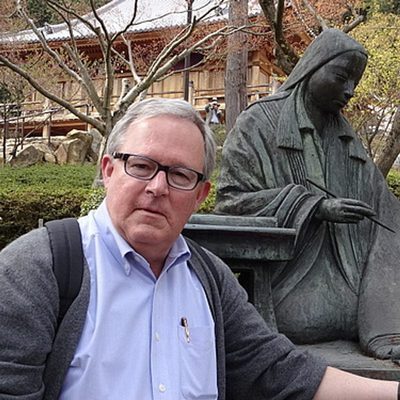A Discussion with Faculty Director Mike Flynn

What inspired you to plan Linguistics and Culture in Japan? What did you hope to accomplish?

Prior to initiating the Linguistics and Culture in Japan program, I worked for many years as the resident director of the Japan Study program at Waseda University and was involved in the AKP Program in Kyoto. Both of these programs were designed to help students learn the Japanese language, but I found that they had some flaws. Due to the heavy emphasis on language-learning, students didn’t have much of a chance to learn about the cultural and historical aspects of Japan, and they missed out on the opportunity to meet other Japanese students and individuals (with the exception of their homestay families). I wanted to change this, so I began planning an off-campus studies program that would focus less on learning the Japanese language itself, and more on learning about the language from a linguistics perspective. I wanted to make it possible for my students to engage in the history and culture of Japan and to adapt themselves to traveling in an unfamiliar environment. I proposed this idea to Carleton, and after it was approved, I went to Kyoto (where the program would be based) to plan the program.
While planning the Linguistics and Culture in Japan program, I wanted to find ways to recruit Japanese university students. I hoped that these Japanese university students would serve as a gateway into Japanese culture for program participants. I wanted to stray away from the homestay approach, primarily because I wanted my students to get out and experience Japanese culture for themselves. I wanted to give them the opportunity to explore the city, to meet/become friends with Japanese students their age, and to realize that they are capable of managing an unfamiliar culture.
What makes this program different from other study abroad programs?
Unlike many other study abroad programs located in Japan, the Linguistics and Culture program doesn’t require that students be fluent or near-fluent in Japanese. In my opinion, such a language requirement limits the number of students who have access to the program. I fully believe that it is possible to have a meaningful experience in a country without being able to speak its language. Additionally, as I mentioned earlier, there are no homestays in this program. I believe we have built another mechanism (free of homestays) through which students can engage with the culture of the country.
What does a typical day look like on your program?
In general, we have our classes on Mondays, Tuesdays, and Wednesdays. Thursdays through Sundays are free, which gives students the flexibility to go out to the city or to take day-trips to various places. Osaka is about an hour away (by train) from Kyoto, so students are encouraged to explore places like this. Occasionally on non-class days, we will take day-trips to sites or partake in events as a whole class. In the past, this has included visiting Buddhist temples or attending professional baseball games!
At the very end of the program, we travel to Tokyo for five days. As a class, we attend a sumo tournament, but students also have a considerable amount of freedom during these final days to explore Tokyo on their own/with each other.
What does the housing situation look like, and what are the benefits of this living arrangement to students?
Students on the Linguistics and Culture program are housed in dormitories in Doshisha University, in Kyoto. The benefits of staying in a dorm rather than in a homestay is that the students are all living close to one another and subsequently get to know each other very well. They form strong relationships with one another, many of which last much longer than the program itself. They establish a network through which they inform each other about interesting events/discoveries happening in and around Kyoto, and they help each other have the best study abroad experience possible. These shared, communal experiences simply don’t happen in a homestay situation (since students living in homestays part ways at the end of each day). Homestays can be quite difficult for people, especially if they don’t “mesh” well with their host families, so living in a dorm avoids these possibilities for conflict.
The Doshisha University dorm that we will be staying at is about a 5-7 minute walk from the center of campus. It’s a fabulous location!
What are you most looking forward to (looking ahead to Spring 2023)?
What is most satisfying to me is watching my students become knowledgeable about, interested in, and excited about Japan. Every Monday, I check in with my students and ask them about what they did during their independent days (Thursdays-Sundays). The adventures that I hear about are always amazing! Additionally, I’m also looking forward to the food! Japan has some fantastic (and unique) culinary experiences.
What advice would you give to students to encourage them to study abroad during their Carleton career? What benefits do you see to the experience in general?
I think studying abroad is one of the most significant experiences that you can have while in college. It doesn’t matter where you go, so long as you get a different experience than you would have here in the United States. Not only will you learn about the place that you are living/studying in, but you will learn to regard your own country of origin differently. In Japan, for example, you will learn about the country-specific ways in which 1) children are raised, 2) people interact with one another, 3) people approach falling in love/marriage, 4) people utilize public transportation, etc. Seeing and experiencing these different ways of living teaches students that things can (and are) done differently than what they are accustomed to in the United States. These ways of living might, in some situations, even be better! Studying abroad will allow you to embrace differences, rather than fear them.
Mike Flynn is the William H. Laird Professor of Linguistics and the Liberal Arts. He has been at Carleton since 1986.